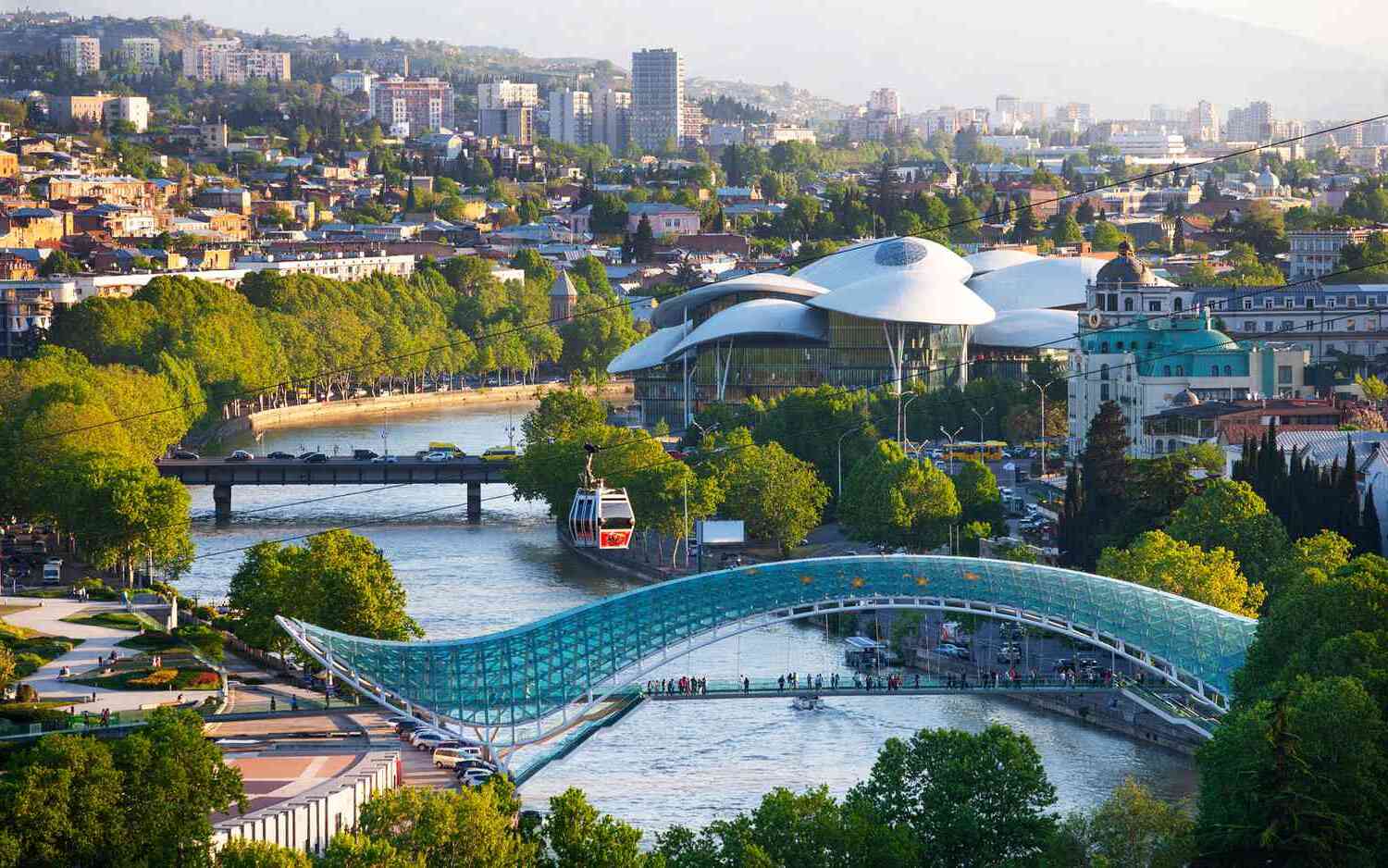
Why should you visit Tbilisi? Tbilisi, Georgia's vibrant capital, offers a unique blend of ancient history and modern charm. Founded in the 5th century AD by King Vakhtang I of Iberia, the city's name means "warm," inspired by its natural hot springs. Tbilisi has been a cultural and political hub for centuries, boasting diverse architecture, rich traditions, and a lively nightlife scene. From the ancient Narikala Fortress to the bustling Rustaveli Avenue, Tbilisi captivates visitors with its stunning landmarks and welcoming atmosphere. Whether you're exploring historic sites or indulging in delicious Georgian cuisine, Tbilisi promises an unforgettable experience.
Key Takeaways:
- Tbilisi, the capital of Georgia, has a rich history dating back to ancient times, with influences from various cultures and empires, making it a vibrant and diverse city today.
- Visitors to Tbilisi can experience a unique blend of traditional and modern attractions, from historic landmarks and cultural festivals to vibrant nightlife and delicious Georgian cuisine.
Founding and Historical Significance
Tbilisi, the capital of Georgia, is a city steeped in history and culture. Its origins date back to ancient times, and its significance has only grown over the centuries.
-
Founding of Tbilisi: King Vakhtang I of Iberia founded Tbilisi in the 5th century AD. The name "Tbilisi" comes from the Georgian word "tbili," meaning "warm," inspired by the city's natural hot springs.
-
Historical Significance: Tbilisi has been the capital of various Georgian kingdoms and republics, serving as a crucial cultural and political hub.
-
Ancient Settlement: The area near Old Tbilisi developed due to trade routes. King Vakhtang discovered it during a hunting trip and decided to build a city there.
-
Fire Worship Temple: When Iran invaded, they introduced fire worship. A temple called Ateshga was built, named from Persian words meaning "fire" and "place."
-
Oldest Church: Anchiskhati church, built in the 6th century, is Tbilisi's oldest church. Originally dedicated to Virgin Mary, it was renamed after an icon of Christ was moved there.
Cultural and Architectural Evolution
Tbilisi's architecture and culture have evolved through various influences, from Persian to Russian, creating a unique blend that defines the city today.
-
Seydabad Period: Part of Old Tbilisi was called Seydabad due to the settlement of a Muslim tribe in the 17th century.
-
Outer City: The area outside the city walls, including Freedom Square and Rustaveli Avenue, was known as the outer city. Noblemen built palaces here, and the first trade centers emerged.
-
First Printing House: In the early 18th century, Vakhtang VI established Tbilisi's first printing house. The first book published was a gospel in 1709.
-
European Development: After becoming part of the Russian Empire in 1801, Tbilisi saw European and Russian architectural styles blend with Georgian elements like wooden balconies.
-
Public Transport: The first public transport was a horse-drawn tram in 1883. Electric trams arrived in 1904, and by 1912, the tram line covered 45 kilometers.
Political Milestones
Tbilisi has been at the center of significant political changes, from declarations of independence to Soviet rule.
-
First Stamp: Tbilisi printed the first stamp in the Russian Empire in 1857, known as the "Tbilisi Unica."
-
Rich History: The city has been part of various empires and kingdoms, hosting numerous historical events and figures.
-
Capital of Transcaucasian Federation: After the Russian Revolution of 1917, Tbilisi served as the capital of the short-lived Transcaucasian Federation.
-
Independence Declaration: On May 26, 1918, Georgia, Armenia, and Azerbaijan declared independence at Vorontsov’s Palace in Tbilisi.
-
Soviet Rule: In 1921, the Bolshevist Russian 11th Red Army invaded Tbilisi, bringing it under Soviet rule until 1991.
Modern Tbilisi
Today, Tbilisi is a vibrant city that attracts millions of tourists with its rich culture, diverse architecture, and lively nightlife.
-
Cultural Center: During Soviet rule, Tbilisi became a cultural hub, hosting the first state-sanctioned rock festival in the USSR in 1980.
-
Mass Protests: The city witnessed significant protests, including the 9 March Massacre in 1956 and the April 9 tragedy in 1989.
-
Tourism Boom: Tbilisi now attracts over 9 million international visitors annually, making it a leading tourist destination.
-
Architectural Diversity: The city features a mix of Art Deco, Russian, Eastern, and Soviet architectural styles, with landmarks like Narikala Fortress and Anchiskhati Basilica.
-
Natural Hot Springs: Tbilisi is famous for its sulfur bathhouses, fed by natural hot springs, offering a unique experience for visitors.
Nightlife and Culture
Tbilisi's nightlife and cultural scene are thriving, offering a mix of traditional and modern experiences.
-
Nightlife Scene: The city has a vibrant nightlife with bars, clubs, and live music venues. Leading clubs include Bassiani and Mtkvarze.
-
LGBTQ+ Community: Tbilisi has a growing queer nightlife scene, with several underground LGBTQ+ venues.
-
Cultural Attractions: The city offers numerous cultural attractions, including national museums and galleries, and hosts various festivals throughout the year.
-
Traditional Cuisine: Tbilisi is renowned for its traditional Georgian cuisine, featuring dishes like khinkali and khachapuri.
-
Day Trips and Excursions: Visitors can take day trips to places like the ancient cave city of Uplistsikhe or the wine region of Kakheti.
Practical Information
For those planning a visit, here are some practical tips to make the most of your trip to Tbilisi.
-
Public Transportation: Tbilisi has a well-developed public transportation system, including buses, metro, and taxis.
-
Local Language: Georgian is the official language, but English is widely spoken in tourist areas.
-
Currency: The currency used is the Georgian Lari (GEL). Visitors can exchange currency at various offices or use ATMs.
-
Best Time to Visit: The best time to visit is during spring (April-June) and autumn (September-November) when the weather is pleasant.
-
Must-Visit Attractions: Key attractions include Narikala Fortress, Holy Trinity Cathedral, and the Bridge of Peace.
Unique Aspects
Tbilisi has several unique aspects that make it a fascinating destination.
-
Safety: Tbilisi is generally safe for travelers, but common safety precautions are advisable.
-
Smoking Regulations: Smoking indoors was banned in May 2018 to improve air quality.
-
Tchaikovsky Street: The city has a street named after Russian composer Pyotr Tchaikovsky, who stayed there between 1886 and 1890.
-
Population and Tourism: Georgia's population is 3.7 million, and in 2018, there were 8 million visitors, leading to a rise in Airbnb usage.
-
Supra: The traditional Georgian feast, Supra, is part of the Intangible Cultural Heritage of Georgia.
-
Soviet Occupation Day: February 25th marks Soviet Occupation Day, commemorating the Soviet invasion of 1921.
-
The Knight in the Panther’s Skin: This 12th-century poem by Shota Rustaveli is a masterpiece of Georgian literature.
-
Narikala Fortress: Constructed in the 4th century for defense, the Narikala Fortress offers stunning views of the city.
-
Rustaveli Avenue and Freedom Square: These areas are central to Tbilisi’s modern development, featuring significant landmarks.
-
Modern Developments: Tbilisi continues to evolve, with modern developments like the reconstruction of Old Town and the growth of its nightlife scene.
Tbilisi: A Blend of History and Modernity
Tbilisi, Georgia's capital, is a city where ancient history meets vibrant modern life. Founded in the 5th century by King Vakhtang I, Tbilisi has grown into a cultural and political hub. Its diverse architecture, from the Narikala Fortress to the Holy Trinity Cathedral, tells stories of various empires and influences. The city's natural hot springs and sulfur bathhouses offer a unique experience, while its nightlife scene, including clubs like Bassiani and Mtkvarze, keeps things lively. Tbilisi's traditional cuisine, featuring dishes like khinkali and khachapuri, is a must-try. With a well-developed public transport system and a welcoming atmosphere, Tbilisi is easy to explore. Whether you're interested in history, culture, or just having a good time, Tbilisi has something for everyone. This city truly offers a unique blend of the old and the new, making it a fascinating destination.
Frequently Asked Questions
Was this page helpful?
Our commitment to delivering trustworthy and engaging content is at the heart of what we do. Each fact on our site is contributed by real users like you, bringing a wealth of diverse insights and information. To ensure the highest standards of accuracy and reliability, our dedicated editors meticulously review each submission. This process guarantees that the facts we share are not only fascinating but also credible. Trust in our commitment to quality and authenticity as you explore and learn with us.


